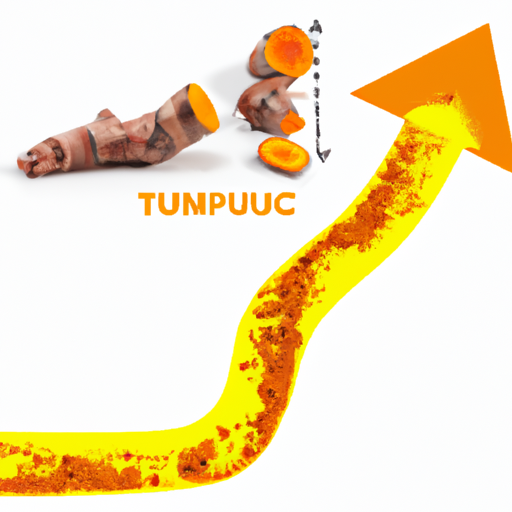How long does it take for turmeric to affect inflammation?
This question may arise for those seeking natural remedies to alleviate inflammation in their bodies. Turmeric, a vibrant yellow spice commonly used in Indian cuisine, has gained attention for its potential anti-inflammatory properties. But how quickly does it work?
To understand this, we must delve into the bioavailability of curcumin, the active compound found in turmeric. Factors such as dosage, frequency of consumption, individual metabolism, and existing health conditions can influence the speed at which turmeric affects inflammation. While some individuals may experience noticeable reduction in inflammation within a few weeks, others may require a longer timeframe.
Additionally, combining turmeric with other anti-inflammatory strategies may enhance its effectiveness. However, it’s important to exercise caution and consult with a healthcare professional for personalized advice, as turmeric may have potential side effects and interactions with certain medications.
So, let’s explore the science behind turmeric’s impact on inflammation and discover the best approach for incorporating it into our wellness routines.
Key Takeaways
- Turmeric contains curcumin, which has significant anti-inflammatory effects.
- Factors such as dosage, frequency of consumption, metabolism, and existing health conditions can influence how quickly turmeric affects inflammation.
- Turmeric’s anti-inflammatory and antioxidant properties can alleviate chronic pain and improve quality of life.
- Turmeric’s bioavailability can be enhanced by consuming it with black pepper or fats, and different formulations of curcumin supplements can increase its absorption compared to raw turmeric.
Understanding Turmeric’s Anti-inflammatory Properties
Turmeric works its magic on inflammation, soothing it like a gentle breeze on a hot summer day. Numerous studies have shown that turmeric, specifically its active compound curcumin, has significant anti-inflammatory effects. Inflammation is a natural response of the body to injury or infection, but when it becomes chronic, it can lead to various health conditions such as arthritis, heart disease, and even cancer. Turmeric’s impact on chronic pain has been particularly noteworthy, with research suggesting that it can alleviate symptoms and improve overall quality of life.
Additionally, turmeric’s role in preventing chronic diseases is gaining attention. Its powerful antioxidant properties help reduce oxidative stress and combat inflammation, which are key factors in the development of chronic diseases. Understanding turmeric’s anti-inflammatory properties is crucial in harnessing its potential benefits for human health.
Transitioning into the subsequent section about the bioavailability of curcumin in turmeric, it is important to explore how our bodies absorb and utilize this potent compound.
The Bioavailability of Curcumin in Turmeric
When consumed, curcumin in turmeric swiftly interacts with the body, creating a vibrant dance of bioavailability. The bioavailability of curcumin refers to its ability to be absorbed and utilized by the body. Understanding the bioavailability of curcumin is crucial in determining how long it takes for turmeric to affect inflammation.
Here are three key factors that influence curcumin absorption and turmeric bioavailability:
-
Solubility: Curcumin is not easily soluble in water, which can limit its absorption. However, consuming turmeric with fats or black pepper can enhance its solubility and improve bioavailability.
-
Metabolism: Curcumin is metabolized quickly by the liver and intestines, which can reduce its bioavailability. Combining turmeric with compounds like piperine from black pepper can inhibit metabolism and increase absorption.
-
Formulation: Different formulations of curcumin supplements, such as liposomal or nanoemulsion, can enhance its bioavailability compared to raw turmeric.
Understanding these factors can help determine the speed at which turmeric’s effects on inflammation can be observed. Transitioning into the subsequent section, it’s important to consider other factors that influence the speed of turmeric’s effects.
Factors That Influence the Speed of Turmeric’s Effects
To fully grasp the speed at which turmeric’s effects can be observed, it’s essential to consider various factors that influence its effectiveness, just like a symphony conductor expertly orchestrating the tempo of a performance.
One key factor is the bioavailability of curcumin, the active compound in turmeric responsible for its anti-inflammatory properties. The body’s ability to absorb curcumin can be influenced by factors such as the presence of black pepper or fats in the meal, as they enhance absorption.
Additionally, the preparation of turmeric can impact its effectiveness. Heat, for example, can increase the bioavailability of curcumin. Optimal turmeric preparation involves combining it with black pepper or fats and heating it.
By taking these factors into consideration, one can maximize the speed at which turmeric’s effects are observed.
Transitioning into the subsequent section about dosage and frequency of consumption, it is important to explore the impact of these variables on turmeric’s effectiveness.
Dosage and Frequency of Consumption
Finding the perfect balance in how much and how often you consume turmeric can be key in maximizing its benefits. To ensure dosage accuracy and optimal absorption, here are three important factors to consider:
-
Start with a low dosage: It’s recommended to begin with a small dose of turmeric and gradually increase it over time. This allows your body to adjust and reduces the risk of any potential side effects.
-
Consider your body weight: The amount of turmeric you need may vary depending on your weight. Generally, a dosage of 1-2 grams per day is considered safe for most individuals.
-
Enhance absorption with black pepper: The active compound in turmeric, curcumin, isn’t easily absorbed by the body. Consuming turmeric with black pepper can significantly enhance its absorption.
By understanding these dosage guidelines and incorporating them into your turmeric consumption routine, you can optimize the effects of this natural anti-inflammatory spice. Transitioning to the next section about individual metabolism and health conditions, it’s important to consider how these factors can further impact the speed of turmeric’s effects.
Individual Metabolism and Health Conditions
Boost your health by understanding how your unique metabolism and specific health conditions can impact the way turmeric works for you. Everyone’s body is different, and as a result, the response to turmeric can vary from person to person.
Some individuals may experience a rapid reduction in inflammation after consuming turmeric, while others may need a longer period of time to notice any effects. Additionally, certain health conditions can also influence the way turmeric interacts with the body. For example, individuals with digestive issues may have difficulty absorbing the active compounds in turmeric, limiting its effectiveness.
It’s also important to consider dietary interactions, as certain foods or medications may interact with turmeric and affect its absorption or efficacy. Understanding these individual factors can help you determine the optimal dosage and frequency of turmeric consumption for your specific needs.
Moving on to the next section about the quality and formulation of turmeric products…
Quality and Formulation of Turmeric Products
As we learned in the previous section, individual metabolism and health conditions can greatly influence the time it takes for turmeric to affect inflammation. However, another important factor to consider is the quality and formulation of turmeric products.
When it comes to turmeric absorption, not all supplements are created equal. The bioavailability of curcumin, the active compound in turmeric, can vary depending on the formulation. Some supplements may use techniques to enhance absorption, such as combining curcumin with black pepper extract or using liposomal delivery systems. These methods can increase the amount of curcumin that’s absorbed by the body and therefore potentially speed up the time it takes to see an effect on inflammation.
The quality and formulation of turmeric products can play a significant role in how quickly they affect inflammation. By optimizing turmeric absorption through specialized formulations, the timeframe for noticeable reduction in inflammation may be shortened.
Timeframe for Noticeable Reduction in Inflammation
The timeframe for when you’ll start noticing a reduction in inflammation can vary depending on factors like individual metabolism and the quality of the turmeric product you’re using. It’s important to note that turmeric is not a quick fix and may require consistent use over a period of time to experience its full benefits. Research suggests that it may take anywhere from a few weeks to a few months to see noticeable improvements in inflammation. It’s also crucial to find the optimal dosage that works for you, as taking too little may not provide the desired effects, while taking too much may lead to side effects. Additionally, while turmeric can be an effective natural remedy for inflammation, it’s worth considering combining it with other anti-inflammatory strategies for enhanced results. These strategies can include lifestyle modifications, such as adopting an anti-inflammatory diet and incorporating regular exercise.
| Factors Affecting Timeframe | Recommendations |
|---|---|
| Individual metabolism | Be patient and consistent with turmeric use |
| Quality of turmeric product | Choose a high-quality turmeric supplement |
| Optimal dosage | Find the right dosage for your body |
| Alternative natural remedies | Explore other natural anti-inflammatory options |
| Combining turmeric with other anti-inflammatory strategies | Consider incorporating lifestyle modifications for better results |
By combining turmeric with other anti-inflammatory strategies, you can maximize its potential benefits and further reduce inflammation.
Combining Turmeric with Other Anti-inflammatory Strategies
To get the most out of turmeric’s anti-inflammatory properties, try incorporating it into your daily routine alongside other natural remedies and lifestyle modifications. In addition to turmeric, there are several other anti-inflammatory foods that can help reduce inflammation in the body. Foods such as ginger, garlic, and green leafy vegetables are known to have anti-inflammatory properties and can be added to your meals or consumed as supplements.
Furthermore, there are various natural remedies that can complement the effects of turmeric. These include omega-3 fatty acids found in fish oil, bromelain from pineapple, and Boswellia extract. By combining turmeric with these other anti-inflammatory strategies, you can enhance its effectiveness and potentially experience faster relief from inflammation.
However, it’s important to note that while these natural remedies generally have few side effects, it’s always advisable to consult with a healthcare professional before starting any new regimen to ensure they’re safe for you.
Potential Side Effects and Precautions
Using turmeric as a supplement or incorporating it into your daily routine alongside other natural remedies and lifestyle modifications can enhance its effectiveness, but it’s important to be aware of potential side effects and take precautions.
While turmeric is generally considered safe when taken in recommended doses, it can interact with certain medications, such as blood thinners, antiplatelet drugs, and stomach acid reducers. It may also have long-term effects on the liver and gallbladder, especially when taken in large amounts or for extended periods.
Additionally, some individuals may experience gastrointestinal symptoms such as nausea, diarrhea, or stomach upset. It’s important to consult with a healthcare professional for personalized advice on the appropriate dosage and any potential interactions or concerns related to long-term use of turmeric as an anti-inflammatory strategy.
Consultation with a Healthcare Professional for Personalized Advice
For personalized advice on how to incorporate turmeric into your daily routine, consult with a healthcare professional who can guide you on the best dosage and potential interactions. It is important to consult with a healthcare professional because they can provide personalized advice based on your specific health needs and medical history. They can help determine the appropriate dosage of turmeric for you and advise on any potential interactions with medications or existing health conditions. Additionally, a healthcare professional can discuss the potential health risks and benefits of turmeric supplementation. While turmeric is generally considered safe for most people when taken in moderation, it may cause side effects such as stomach upset, diarrhea, or allergic reactions in some individuals. It is always best to seek guidance from a healthcare professional to ensure you are using turmeric safely and effectively.
| Health Risks | Benefits of Turmeric Supplementation |
|---|---|
| – Stomach upset | – Anti-inflammatory properties |
| – Diarrhea | – Antioxidant effects |
| – Allergic reactions | – Potential pain relief |
| – Improved digestion |
Frequently Asked Questions
Can turmeric completely eliminate inflammation?
Turmeric can have a positive effect on acute inflammation and inflammatory diseases. While it may not completely eliminate inflammation, studies suggest that its active compound, curcumin, has anti-inflammatory properties that can help manage symptoms and reduce inflammation.
Is there a specific time of day that is best for taking turmeric to see its anti-inflammatory effects?
The best time to take turmeric for its anti-inflammatory effects is not well-established. However, studies suggest that taking an optimal dosage of turmeric extract with meals may enhance its absorption and effectiveness in reducing inflammation.
Can turmeric interact with other medications or supplements?
Yes, turmeric can interact with certain medications and supplements, potentially increasing the risk of bleeding. It is important to consult a healthcare professional for dosage recommendations and to discuss potential risks.
Are there any specific health conditions that may prevent turmeric from being effective in reducing inflammation?
Certain health conditions, such as gastrointestinal disorders or bleeding disorders, may interfere with turmeric’s effectiveness in reducing inflammation. Additionally, excessive use of turmeric may cause stomach upset or interact with certain medications, so caution is advised.
How long does it take for turmeric to start working on chronic inflammation?
The best time to take turmeric for chronic inflammation is with meals, as it is better absorbed with fats. The recommended dosage is typically 500-2,000 mg per day, but it’s important to consult with a healthcare professional for personalized advice.
Conclusion
In conclusion, it’s truly mind-boggling how long it takes for turmeric to work its magic on inflammation. With its anti-inflammatory properties and the bioavailability of curcumin, you’d think it would be a quick fix. But alas, factors like dosage, metabolism, and health conditions can slow down the process.
So, don’t expect an overnight miracle. It might take some time for that noticeable reduction in inflammation. And hey, why not spice things up by combining turmeric with other anti-inflammatory strategies? Just remember to consult a healthcare professional for personalized advice, because you don’t want to be turmeric-ing around with your health.










